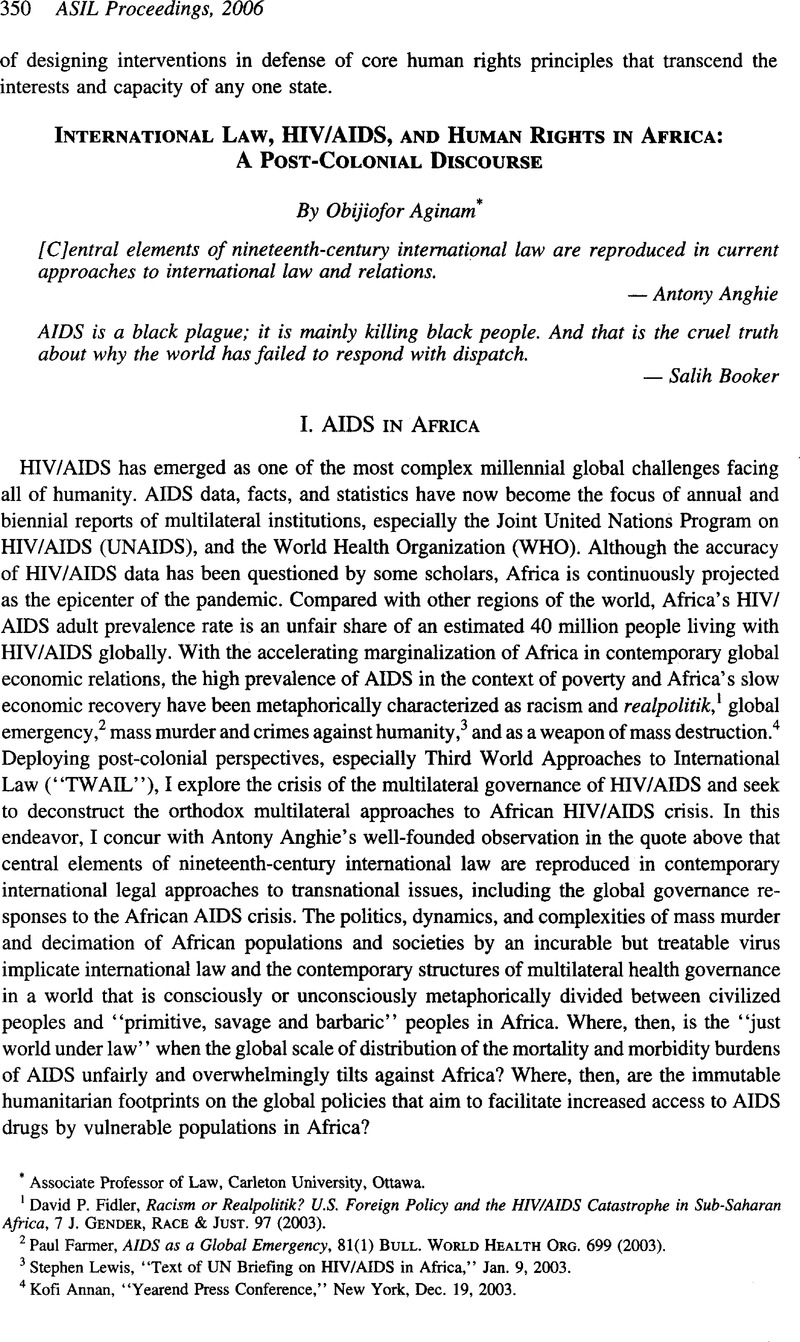No CrossRef data available.
Article contents
International Law, HIV/AIDS, and Human Rights in Africa: A Post-Colonial Discourse
Published online by Cambridge University Press: 28 February 2017
Abstract

- Type
- The HIV/AIDS Pandemic and the Role of International Law
- Information
- Copyright
- Copyright © American Society of International Law 2006
References
1 Fidler, David P. Racism or Realpolitik? U.S. Foreign Policy and the HIV/AIDS Catastrophe in Sub-Saharan Africa, 7 J. Gender, Race & Just. 97 (2003)Google Scholar.
2 Farmer, Paul, AIDS as a Global Emergency, 81(1) Bull. World Health Org. 699 (2003)Google ScholarPubMed.
3 Stephen Lewis, “Text of UN Briefing on HIV/AIDS in Africa,” Jan. 9, 2003.
4 Kofi Annan, “Yearend Press Conference,” New York, Dec. 19, 2003.
5 Gathii, James Thuo, International Law and Eurocentricity, 9 EJIL 184 (1998)CrossRefGoogle Scholar.
6 Anghie, Antony, Finding the Peripheries: Sovereignty and Colonialism in Nineteenth-Century International Law, 40 Harv. Int’I. L. J. 1, 73 (1999)Google Scholar.
7 Mutua, Makau, What is Twail?, 95 ASIL Proc. 31, 31 (2000)Google Scholar.
8 Id.
9 Id.
10 I borrowed the language of “post-ontological international law” from Thomas Franck’ s majestic work, Fairness in International Law and Institutions 4-8 (1995).
11 I borrowed the usage and images of “victims and savages” from Makau Mutua’s use of those terms in the international human rights movement in relation with the Third World. See Mutua, Makau, Savages, Victims and Saviors: The Metaphor of Human Rights, 42 Harv. Int’l L. J. 201-45 (2001)Google Scholar.
12 African AIDS Crisis is Still Largely Ignored, Reuters Med. News (2001), quoted in Fidler, supra note 1, at 106.
13 S. Booker & W. Minter, Global Apartheid, The Nation, July 9, 2001, at 11-17.
14 Mutua, supra note 11, at 202.
15 Id. at 203.
16 Farmer, supra note 2, at 699.
17 Preamble, Constitution of the World Health Organization (1946), available at <http://www.who.int/governance/en/>.
18 Id.
19 Art. 2(1), International Covenant on Economic, Social and Cultural Rights, GA Res. 2200A (XXI) (Dec. 16, 1966).
20 See Toebes, B., Towards an Improved Understanding of the International Human Right to Health, 21 Hum. Rts. Q. 661 (1999)CrossRefGoogle ScholarPubMed (arguing that although it is often asserted that all human rights are interdependent, interrelated, and of equal importance, in practice, Western states and NGOs have tended to treat economic, social and cultural rights as if they were less important than civil and political rights).
21 See Leary, V., The Right to Health in International Human Rights Law, 1 Health & Hum. Rts. 25, 36 (1994)Google ScholarPubMed.
22 For insightful discussion of the norms of human rights as they relate to health, see Joseph, Sarah, Pharmaceutical Corporations and Access to Drugs: The “Fourth Wave” of Corporate Human Rights Scrutiny, 38 Hum. Rts. Q. 425-52 (2003)CrossRefGoogle Scholar; Leary, Virginia, The Right to Health in International Human Rights Law, 1 Health & Hum. Rts. 25 (1994)Google ScholarPubMed; Toebes, B., Towards an Improved Understanding of the International Human Right to Health, 38 Hum. Rts. Q. 661 (1999)CrossRefGoogle Scholar; Aginam, Obuiofor, Global Health Governance: International and Public Health in A Divided World 35-40 (2005)Google Scholar. For thoughts from the UN Special Rapporteur on Right to Health, see The Right of Everyone to the Enjoyment of the Highest Attainable Standard of Physical and Mental Health (Feb. 13, 2003).
23 Robert Howse & Makau Mutua, Protecting Human Rights in A Global Economy: Challenges for the World Trade Organization 6 (2000).
24 Id. at 7.
25 WHO defines essential medicines as “those medicines that satisfy the health care needs of the majority of the population; they should therefore be available at all times in adequate amounts and in the appropriate dosage form.” See WHO Action Programme on Essential Drugs, Globalization and Access to Drugs: Perspectives on the WTO/TRIPS Agreement 10 (1999).
26 See Jefferey D. Sachs, The End of Poverty: Economic Possibilities for Our Time 188 (2005) (discussing the impact and challenges of HIV/Aids, malaria and other diseases on Africa’s economic development); World Health Organization, Macroeconomics and Health: Investing in Health for Economic Development— Report of the Commission on Macroeconomics and Health (2001).
27 John M. Last, Public Health and Human Ecology 337 (1998).




